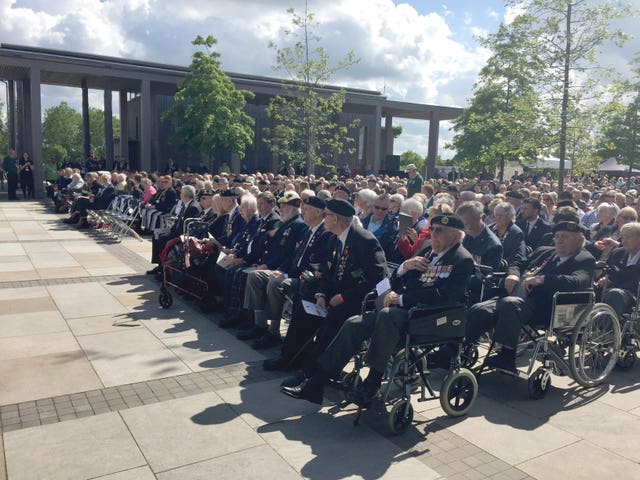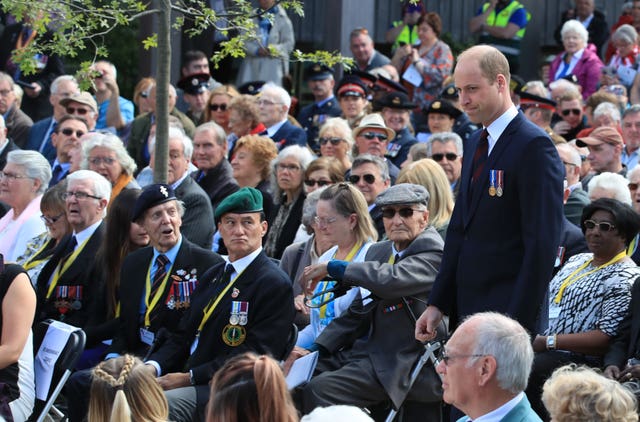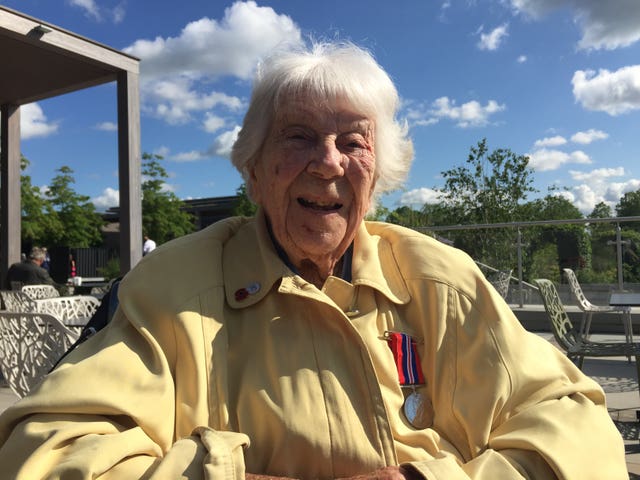William pays tribute to ‘ultimate sacrifice’ of D-Day fallen at memorial service
More than 2,000 people including 20 veterans of the Normandy Landings attended

The Duke of Cambridge has laid a wreath to those who made “the ultimate sacrifice” during a service of commemoration marking the 75th anniversary of the Normandy Landings.
Prince William joined more than 2,000 people, including some 20 D-Day veterans, for a service in Heroes’ Square, National Memorial Arboretum, before paying his respects at the Normandy Campaign Memorial.
The Duke addressed the ranks of visitors, many of whom bore medals, wore berets, or carried other tokens to show their service to the country.

He said: “Four years ago our nation and empire stood alone against an overwhelming enemy, with our backs to the wall.
“Now once more a supreme test has to be faced.
“This time the challenge is not to fight to survive, but to fight to win the final victory for the good cause.
“At this historic moment surely not one of us is too busy, too young, or too old to play a part in a nationwide, perchance a world-wide vigil of prayer as the great crusade sets forth.”

Among those attending was 100-year-old Pixie Jenkins, a former Wren in the Women’s Royal Naval Service.
As a 21-year-old, Mrs Jenkins helped drive troops and equipment to Newhaven Docks in East Sussex in the the build-up to D-Day and throughout the Normandy Landings.
The centenarian, from Aldridge, near Walsall, West Midlands, was among a handful of veterans who have been able to travel to the special service in Staffordshire.
Reflecting on the anniversary, she said: “I think the men that went over were wonderful and I hope the younger people today realise how fortunate they are to have people like that.
“I think so many youngsters today have forgotten about the men.
“They look at them and think ‘they’re old men now’ – to them they’re just old men.
“And they’re not, they are wonderful, wonderful men that went over.
“I salute them all.”

As Prince William stepped forward to place the poppy wreath on the Normandy Landings Memorial, the day’s bright sunshine disappeared behind black clouds, bringing a brief deluge of rain.
It later prompted former Royal Engineer Don Sheppard, who still carries a sliver of shrapnel in his lung from a German shell fired on D-Day, to recall the dreadful conditions crossing the English Channel.
“It was rough,” said the 99-year-old, from Basildon, Essex.

His unit was then sent forward to Pegasus Bridge, captured by British paratroopers in the first hours of the battle, and ordered to blow it up if a predicted German counter-attack threatened the Normandy beachhead.
The attack did not materialise, but the hard-fighting continued as he and his comrades spent three months fighting crack German troops dug in among the thick hedgerows, known as the bocage.
He said: “One tank could hold up a whole battalion in that country.
“I think that time in the Orne valley was worse than D-Day.
“At Chateau St Come, around near Ranville and Breville, we lost 110 guys there in one night.
“Another time, a platoon from the Black Watch set off and the Germans were in the ditches.
“The platoon got slaughtered.”
Mr Sheppard was among the veterans sharing their stories with the Prince, as was Mrs Jenkins.

He told the Duke how, on the day, his vessel beached to unload equipment but then ended up stranded under German gunfire – and also hit a mine going in.
Mr Brunt, twice a former mayor of Biggleswade, Bedfordshire, said: “You’re supposed to haul yourself off before the tide changes – but our ship missed the tide.
“So we had to wait for 12 hours. It wasn’t the best place to be.”
Prince William asked what his “abiding memory” of that day had been.
Mr Brunt replied: “I was only 19. I didn’t know fear.
“I remember the shock of the bodies floating in the water and the destruction going on around.
“If you were lucky, you missed the worst of it.”





